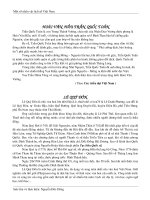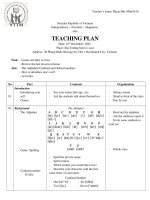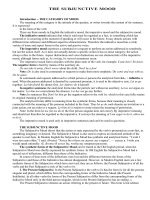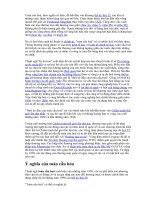Tài liệu tham khảo writing sample
Bạn đang xem bản rút gọn của tài liệu. Xem và tải ngay bản đầy đủ của tài liệu tại đây (1.99 MB, 345 trang )
For
more
material
and
information,
please
visit
Tai
L
ieu
Du
Hoc
at
www.tailieudu
hoc.org
109 Argument Sample
14
1. The following appeared as part of an annual report sent to stockhold
ers by Olympic Foods, a
processor of frozen foods.
14
2. The following appeared in a memorandum from the business depart
ment of the Apogee Company.
15
3. The following appeared in a memorandum issued by a large city’s co
uncil on the arts
15
4. The following appeared in a report presented for discussion at a mee
ting of the directors of a
company that manufactures parts for heavy machinery.
16
5. The following appeared in an announcement issued by the publisher
of The Mercury, a weekly
newspaper.
17
6. The following appeared as part of an article in a magazine devoted t
o regional life.
18
7. The following appeared in the health section of a magazine on trend
s and lifestyles
19
8. The following appeared in the editorial section of a corporate newsle
tter.
19
9. The following appeared in the opinion column of a financial magazin
e
20
10. The following appeared in the editorial section of a local newspaper
.
22
11. The following appeared in the editorial section of a local newspaper
.
23
12. The following appeared as part of a promotional campaign to sell a
dvertising space in the Daily
Gazette to grocery stores in the Marston area.
24
13. The following appeared as part of a campaign to sell advertising ti
me on a local radio station to
local businesses.
25
14. The following appeared as part of a newspaper editorial
26
15. The following appeared as a part of an advertisement for Adams, w
ho is seeking reelection as
governor.
27
16. The following appeared as part of an article in the education sectio
n of a Waymarsh City
newspaper.
28
17. The following appeared in an article in a consumer-products magaz
ine.
29
18. The following is an excerpt from a memo written by the head of a g
overnmental department. 30
19. The following appeared as part of an article in the travel section of a
newspaper
31
20. The following appeared in an article in a health and fitness magazin
e
32
21. The following appeared as part of an editorial in an industry newsle
tter.
33
22. The following appeared in the editorial section of a newspaper.
34
23. The following appeared in a speech delivered by a member of the ci
ty council.
35
24. The following appeared in a memo from the customer service divisi
on to the manager of
For
more
material
and
information,
please
visit
Tai
L
ieu
Du
Hoc
at
www.tailieud
uhoc.org
Mammon Savings and Loan.
36
25. The following appeared as part of an article in a magazine on lifesty
les.
37
26. The following appeared in a memorandum from a member of a fina
ncial management and
consulting firm
38
27. The following appeared in a newspaper editorial
39
28. The following appeared in the editorial section of a local newspaper
.
40
29. The following was excerpted from the speech of a spokesperson fo
r Synthetic Farm Products,
Inc
41
30. The following appeared in a newspaper story giving advice about i
nvestments
42
31. The following appeared as part of the business plan of an investme
nt and financial consulting
firm.
43
32. The following appeared in the editorial section of a West Cambria n
ewspaper.
44
33. The following is part of a business plan being discussed at a board
meeting of the Perks
Company
44
34. The following appeared as part of a plan proposed by an executive
of the Easy Credit Company
to the president.
45
35. The following appeared as part of a recommendation from the fina
ncial planning office to the
administration of Fern Valley University.
46
36. The following appeared in an article in a college departmental new
sletter
47
37. The following appeared as part of an article in the business section
of a local newspaper.
48
38. The following appeared in the editorial section of a campus newspa
per
49
39. The following appeared in an Avia Airlines departmental memoran
dum
50
40. The following appeared as part of an article in a weekly newsmaga
zine
51
41. The following appeared as part of an article in a trade publication.
52
42. The following appeared in the opinion section of a national newsm
agazine.
53
43. The following appeared in an article in the health section of a news
paper.
53
44. The following is part of a business plan created by the managemen
t of the Megamart grocery
store
54
45. The following appeared as part of a column in a popular entertainm
ent magazine
55
46. The following appeared in a memorandum from the directors of a s
ecurity and safety consulting
service.
56
47. The following appeared as part of an article in the business section
of a local newspaper.
57
48. The following appeared in the editorial section of a local newspaper
.
58
For
more
material
and
information,
please
visit
Tai
L
ieu
Du
Hoc
at
www.tailieudu
hoc.org
49. The following appeared in the editorial section of a local newspaper
.
58
50. The following appeared as part of a business plan recommended b
y the new manager of a
musical rock group called Zapped.
59
51. The following appeared in a magazine article on trends and lifestyl
es.
60
52. The following editorial appeared in the Elm City paper.
61
53. The following appeared as part of an editorial in a weekly newsmag
azine.
62
54. The following appeared in an Excelsior Company memorandum
62
55. The following appeared as part of an article in a health club trade p
ublication
63
56. The following appeared as part of an article in a popular arts and lei
sure magazine.
64
57. The following is from a campaign by Big Boards, Inc., to convince c
ompanies in River City that
their sales will increase if they use Big Boards billboards for advertisi
ng their locally
manufactured products
65
58. The following appeared as part of an article on government fundin
g of environmental regulatory
agencies.
66
59. The following appeared as part of an article in a popular science ma
gazine
67
60. The following appeared as part of a recommendation by one of the
directors of the Beta
Company
68
61. The following appeared in the letters-to-the-editor section of a loc
al newspaper
69
62. The following appeared as part of an article in the business section
of a local newspaper.
69
63. The following appeared in a memorandum from the Director of Hu
man Resources to the
executive officers of Company X.
70
64. The following appeared in a memorandum from the vice president
of Road Food, an
international chain of fast-food restaurants.
71
65. The following appeared in the promotional literature for Cerberus d
og food.
72
66. The following appeared in an article in a travel magazine.
73
67. The following appeared in a memorandum to the planning departm
ent of an investment firm. 74
68. The following appeared in a memorandum from a company’s mark
eting department
74
69. The following appeared in a memorandum from the president of a
company that makes (
Glabrous) shampoo.
75
70. The following appeared as part of a recommendation from the busi
ness manager of a
department store.
76
71. The following appeared in a letter to the editor of a regional newsp
aper.
77
72. The following appeared as part of an editorial in a campus newspa
per
78
For
more
material
and
information,
please
visit
Tai
L
ieu
Du
Hoc
at
www.tailieud
uhoc.org
73. The following appeared as part of a memorandum from a governm
ent agency
79
74. The following appeared as part of an article in an entertainment ma
gazine
79
75. The following appeared in a letter to the editor of a popular science
and technology magazine.
80
76. The following appeared in the editorial section of a local newspaper
.
81
77. The following appeared in the editorial section of a local newspaper
82
78. The following appeared in the editorial section of a monthly busine
ss newsmagazine.
83
79. The following appeared as part of a company memorandum.
83
80. The following appeared in the editorial section of a daily newspaper
.
84
81. The following appeared in the editorial section of a newspaper in th
e country of West Cambria.
85
82. The following appeared as part of a memorandum from the vice pr
esident of Nostrum, a large
pharmaceutical corporation.
86
83. The following appeared as part of an article on trends in television
87
84. The following appeared as part of an article in the business section
of a daily newspaper.
88
85. The following appeared as part of an article in a photography maga
zine.
89
86. The following appeared as part of a letter to the editor of a local ne
wspaper
90
87. The following appeared in an ad for a book titled How to Write a Scr
eenplay for a Movie.
91
88. The following appeared in a memorandum from the ElectroWares c
ompany’s marketing
department.
92
89. The following is taken from an editorial in a local newspaper.
93
90. The following appeared as part of an article in a local newspaper
93
91. The following appeared in a proposal from the development office
at Platonic University
94
92. The following appeared as part of an article in the business section
of a local newspaper.
95
93. The following appeared in a memorandum from the manager of K
MTV, a television station.
96
94. The following appeared as part of an article in a computer magazin
e
97
95. The following was excerpted from an article in a farming trade publi
cation.
97
96. The following appeared in a letter to prospective students from the
admissions office at Plateau
College.
98
97. The following appeared in a memorandum sent by a vice-president
of the Nadir Company to the
company’s human resources department.
99
98. The following appeared as part of an article in a trade magazine for
breweries.
100
For
more
material
and
information,
please
visit
Tai
L
ieu
Du
Hoc
at
www.tailieudu
hoc.org
99. The following appeared in an editorial from a newspaper serving th
e town of Saluda.
101
100. The following appeared as part of an article in the book section of
a newspaper
102
101. The following appeared as an editorial in a magazine concerned w
ith educational issues.
103
102. The following appeared as part of a business plan created by the
management of the Take
Heart Fitness Center.
104
103. The following appeared in a letter from a staff member in the offic
e of admissions at Argent
University.
105
104. The following appeared as part of a memorandum from the loan d
epartment of the Frostbite
National Bank
106
105. The following appeared as part of a letter to the editor of a local ne
wspaper
107
106. The following appeared in a memo to the Saluda town council fro
m the town’s business
manager
107
107. The following appeared in a memorandum written by the assistan
t manager of a store that
sells gourmet food items from various countries
108
108. The following appeared in a memorandum from the director of re
search and development at
Ready-to-Ware, a software engineering firm.
109
109. The following appeared in a memorandum from the vice-
president of the Dolci Candy Company.
110
115 ISSUE Sample
112
1. In some countries, television and radio programs are carefully censo
red for offensive language
and behavior. In other countries, there is little or no censorship
112
2. “It is unrealistic to expect individual nations to make, independently,
the sacrifices necessary to
conserve energy. International leadership and worldwide cooperati
on are essential if we expect
to protect the world’s energy resources for future generations.”
112
3. “Corporations and other businesses should try to eliminate the man
y ranks and salary grades that
classify employees according to their experience and expertise. A ‘fl
at’ organizational structure is
more likely to encourage collegiality and cooperation among emplo
yees.”
113
4. “Of all the manifestations* of power, restraint in the use of that powe
r impresses people most.”
114
5. “All groups and organizations should function as teams in which ever
yone makes decisions and
shares responsibilities and duties. Giving one person central authori
ty and responsibility for a
project or task is not an effective way to get work done.”
115
6. “There is only one definition of success — to be able to spend your lif
e in your own way.”
115
7. “The best way to give advice to other people is to find out what they
want and then advise them
how to attain it.”
116
For
more
material
and
information,
please
visit
Tai
L
ieu
Du
Hoc
at
www.tailieud
uhoc.org
8. “For hundreds of years, the monetary system of most countries has
been based on the exchange
of metal coins and printed pieces of paper. However, because of rece
nt developments in
technology, the international community should consider replacing
the entire system of coins and
paper with a system of electronic accounts of credits and debits.”
117
9. “Employees should keep their private lives and personal activities as
separate as possible from
the workplace.”
118
10. “In any enterprise, the process of making or doing something is ulti
mately more important than
the final product.”
118
11. “When someone achieves greatness in any field — such as the arts,
science, politics, or business
— that person’s achievements are more important than any of his or
her personal faults.”
119
12. “Education has become the main provider of individual opportunity
in our society. Just as
property and money once were the keys to success, education has n
ow become the element
that most ensures success in life.”
120
13. “Responsibility for preserving the natural environment ultimately b
elongs to each individual
person, not to government.”
121
14. “Organizations should be structured in a clear hierarchy in which th
e people at each level, from
top to bottom, are held accountable for completing a particular com
ponent of the work. Any
other organizational structure goes against human nature and will u
ltimately prove fruitless.” 121
15. “Nations should cooperate to develop regulations that limit childre
n’s access to adult material on
the Internet.” *
122
16. “Public buildings reveal much about the attitudes and values of the
society that builds them.
Today’s new schools, courthouses, airports, and libraries, for examp
le, reflect the attitudes and
values of today’s society.”
123
17. “Some people believe that the best approach to effective time man
agement is to make detailed
daily and long-term plans and then to adhere to them. However, this
highly structured approach
to work is counterproductive. Time management needs to be flexibl
e so that employees can
respond to unexpected problems as they arise.”
124
18. “If the primary duty and concern of a corporation is to make money
, then conflict is inevitable
when the corporation must also acknowledge a duty to serve society
.”
125
19. Some employers who recruit recent college graduates for entry-
level jobs evaluate applicants
only on their performance in business courses such as accounting,
marketing, and economics.
However, other employers also expect applicants to have a broad ba
ckground in such courses as
history, literature, and philosophy.
125
20. “In this age of automation, many people complain that humans are
becoming subservient to
machines. But, in fact, machines are continually improving our lives.
”
127
21. “Job security and salary should be based on employee performanc
e, not on years of service.
Rewarding employees primarily for years of service discourages peo
ple from maintaining
For
more
material
and
information,
please
visit
Tai
L
ieu
Du
Hoc
at
www.tailieudu
hoc.org
consistently high levels of productivity.”
128
22. “Clearly, government has a responsibility to support the arts. Howe
ver, if that support is going to
produce anything of value, government must place no restrictions o
n the art that is produced.”
129
23. “Schools should be responsible only for teaching academic skills an
d not for teaching ethical and
social values.”
129
24. “A powerful business leader has far more opportunity to influence t
he course of a community or
a nation than does any government official.”
130
25. “The best strategy for managing a business, or any enterprise, is to
find the most capable
people and give them as much authority as possible.”
131
26. “Location has traditionally been one of the most important determi
nants of a business’s success.
The importance of location is not likely to change, no matter how ad
vanced the development of
computer communications and others kinds of technology becomes
.”
132
27. “A company’s long-term success is primarily dependent on the job s
atisfaction and the job
security felt by the company’s employees.”
132
28. “Because businesses use high-quality advertising to sell low-
quality products, schools should
give students extensive training in how to make informed decisions
before making purchases.”
133
29. “Too many people think only about getting results. The key to succ
ess, however, is to focus on
the specific task at hand and not to worry about results.”
134
30. “Companies benefit when they discourage employees from workin
g extra hours or taking work
home. When employees spend their leisure time without ‘producing
’ something for the job, they
will be more focused and effective when they return to work.”
134
31. “Financial gain should be the most important factor in choosing a c
areer.”
135
32. “You can tell the ideas of a nation by its advertisements.”
136
33. “People are likely to accept as a leader only someone who has dem
onstrated an ability to
perform the same tasks that he or she expects others to perform.”
137
34. “All citizens should be required to perform a specified amount of pu
blic service. Such service
would benefit not only the country as a whole but also the individual
participants.”
137
35. “Business relations are infected through and through with the dise
ase of short-sighted motives.
We are so concerned with immediate results and short-term goals t
hat we fail to look beyond
them.”
138
36. “Businesses and other organizations have overemphasized the im
portance of working as a team.
Clearly, in any human group, it is the strong individual, the person wi
th the most commitment
and energy, who gets things done.”
139
37. “Since science and technology are becoming more and more essen
tial to modern society,
For
more
material
and
information,
please
visit
Tai
L
ieu
Du
Hoc
at
www.tailieud
uhoc.org
schools should devote more time to teaching science and technolog
y and less to teaching the
arts and humanities.”
139
38. “Courtesy is rapidly disappearing from everyday interactions, and
as a result, we are all the
poorer for it.”
140
39. “It is difficult for people to achieve professional success without sac
rificing important aspects of
a fulfilling personal life.”
141
40. “With the increasing emphasis on a global economy and internatio
nal cooperation, people need
to understand that their role as citizens of the world is more importa
nt than their role as citizens
of a particular country.”
142
41. “The best way to preserve the natural environment is to impose pe
nalties—whether fines,
imprisonment, or other punishments—on those who are most respo
nsible for polluting or
otherwise damaging it.”
142
42. “Scientists are continually redefining the standards for what is ben
eficial or harmful to the
environment. Since these standards keep shifting, companies shoul
d resist changing their
products and processes in response to each new recommendation u
ntil those recommendations
become government regulations.”
143
43. “The most important reason for studying history is not that knowle
dge of history can make us
better people or a better society but that it can provide clues to solvi
ng the societal problems
that we face today.”
144
44. “All companies should invest heavily in advertising because high-
quality advertising can sell
almost any product or service.”
145
45. “The most effective way for a businessperson to maximize profits o
ver a long period of time is
to follow the highest standards of ethics.”
146
46. Businesses are as likely as are governments to establish large bure
aucracies, but bureaucracy is
far more damaging to a business than it is to a government
147
47. The primary responsibility for preventing environmental damage b
elongs to government, not to
individuals or private industry.
147
48. In matching job candidates with job openings, managers must con
sider not only such variables
as previous work experience and educational background but also p
ersonality traits and work
habits, which are more difficult to judge.
148
49. “Ask most older people to identify the key to success, and they are li
kely to reply ‘hard work.’
Yet, I would tell people starting off in a career that work in itself is not
the key. In fact, you have
to approach work cautiously—too much or too little can be self-
defeating.”
149
50. How far should a supervisor go in criticizing the performance of a s
ubordinate? Some highly
successful managers have been known to rely on verbal abuse and i
ntimidation
150
51. “The presence of a competitor is always beneficial to a company. C
ompetition forces a company
to change itself in ways that improve its practices.”
150
For
more
material
and
information,
please
visit
Tai
L
ieu
Du
Hoc
at
www.tailieudu
hoc.org
52. “Successful individuals typically set their next goal somewhat—but
not too much—above their
last achievement. In this way, they steadily raise their level of aspirat
ion.”
151
53. “The term ‘user-friendly’ is usually applied to the trouble-free way t
hat computer software
moves people from screen to screen, function to function. However,
the term can also refer to a
government office, a library, public transportation, or anything desi
gned to provide information
or services in an easy, friendly way. Just as all societies have many st
riking examples of
user-friendly services, so do they abound in examples of user-
unfriendly systems.” Identify a
system or service that you have found to be either “user-friendly” or
“user-unfriendly.”
152
54. “Popular entertainment is overly influenced by commercial interest
s. Superficiality, obscenity,
and violence characterize films and television today because those q
ualities are commercially
successful.”
153
55. “Never tell people how to do things. Tell them what to do, and they
will surprise you with their
ingenuity.”
154
56. “The secret of business is to know something that nobody else kno
ws.”
154
57. “Everywhere, it seems, there are clear and positive signs that peopl
e are becoming more
respectful of one another’s differences.”
155
58. “What is the final objective of business? It is to make the obtaining
of a living—the obtaining of
food, clothing, shelter, and a minimum of luxuries—so mechanical a
nd so little time-consuming
that people shall have time for other things.”
156
59. “Juvenile crime is a serious social problem, and businesses must be
come more involved in
helping to prevent it.”
157
60. “Employers should have no right to obtain information about their
employees’ health or other
aspects of their personal lives without the employees’ permission.”
157
61. “Even at its best, a government is a tremendous burden to busines
s, though a necessary one.”
158
62. “What education fails to teach us is to see the human community as
one. Rather than focus on
the unique differences that separate one nation from another, educ
ation should focus on the
similarities among all people and places on Earth.”
159
63. “As government bureaucracy increases, citizens become more and
more separated from their
government.”
159
64. “The goal of business should not be to make as big a profit as possi
ble. Instead, business
should also concern itself with the wellbeing (n.
) of the public.”
160
65. “The rise of multinational corporations is leading to global homoge
neity*. Because people
everywhere are beginning to want the same products and services,
regional differences are
rapidly disappearing.”
161
66. “Manufacturers are responsible for ensuring that their products ar
e safe. If a product injures
someone, for whatever reason, the manufacturer should be held leg
ally and financially
For
more
material
and
information,
please
visit
Tai
L
ieu
Du
Hoc
at
www.tailieud
uhoc.org
accountable for the injury.”
162
67. “Work greatly influences people’s personal lives—their special inter
ests, their leisure activities,
even their appearance away from the workplace.”
162
68. “Since the physical work environment affects employee productivit
y and morale, the employees
themselves should have the right to decide how their workplace is d
esigned.”
163
69. “The most important quality in an employee is not specific knowled
ge or technical competence.
Instead, it is the ability to work well with other employees.”
164
70. “So long as no laws are broken, there is nothing unethical about doi
ng whatever you need to do
to promote existing products or to create new products.”
165
71. “Commercialism has become too widespread. It has even crept int
o schools and places of
worship. Every nation should place limits on what kinds of products,
if any, can be sold at certain
events or places.”
165
72. “Companies should not try to improve employees’ performance by
giving incentives—for
example, awards or gifts. These incentives encourage negative kind
s of behavior instead of
encouraging a genuine interest in doing the work well.”
166
73. People often give the following advice: “Be yourself. Follow your ins
tincts and behave in a way
that feels natural.”
167
74. “The people we remember best are the ones who broke the rules.” .
168
75. “There are essentially two forces that motivate people: self-
interest and fear.”
168
76. “For a leader there is nothing more difficult, and therefore more im
portant, than to be able to
make decisions.”
169
77. Although “genius” is difficult to define, one of the qualities of geniu
s is the ability to transcend
traditional modes of thought and create new ones.
170
78. Most people would agree that buildings represent a valuable recor
d of any society’s past, but
controversy arises when old buildings stand on ground that modern
planners feel could be better
used for modern purposes
170
79. “The ability to deal with people is as purchasable a commodity as s
ugar or coffee, and it is
worth more than any other commodity under the sun.”
171
80. “As individuals, people save too little and borrow too much.”
172
81. “No one can possibly achieve any real and lasting success or ‘get ric
h’ in business by conforming
to conventional practices or ways of thinking.”
173
82. “Business and government must do more, much more, to meet the
needs and goals of women
in the workplace.”
173
83. “We shape our buildings and afterwards our buildings shape us.”
174
84. “A business should not be held responsible for providing customers
with complete information
For
more
material
and
information,
please
visit
Tai
L
ieu
Du
Hoc
at
www.tailieudu
hoc.org
11
about its products or services; customers should have the responsib
ility of gathering information
about the products or services they may want to buy.”
175
85. “Advertising is the most influential and therefore the most importa
nt artistic achievement of the
twentieth century.”
176
86. “Whether promoting a product, an event, or a person, an advertisi
ng campaign is most effective
when it appeals to emotion rather than to reason.”
176
87. “As technologies and the demand for certain services change, man
y workers will lose their jobs.
The responsibility for those people to adjust to such change should
belong to the individual
worker, not to government or to business.”
177
88. “Each generation must accept blame not only for the hateful words
and actions of some of its
members but also for the failure of other members to speak out agai
nst those words and
actions.”
178
89. “The study of history is largely a waste of time because it prevents
us from focusing on the
challenges of the present.”
178
90. “People often complain that products are not made to last. They fe
el that making products that
wear out fairly quickly wastes both natural and human resources. W
hat they fail to see, however,
is that such manufacturing practices keep costs down for the consu
mer and stimulate demand.”
179
91. “Government should establish regulations to reduce or eliminate a
ny suspected health hazards
in the environment, even when the scientific studies of these health
hazards are incomplete or
contradictory.”
181
92. “Employees should show loyalty to their company by fully supporti
ng the company’s managers
and policies, even when the employees believe that the managers a
nd policies are misguided.”
182
93. “To be successful, companies should trust their workers and give th
em as much freedom as
possible. Any company that tries to control employees’ behavior thr
ough a strict system of
rewards and punishments will soon find that such controls have a ne
gative effect on employee
morale and, consequently, on the company’s success.”
182
94. “If parents want to prepare their children to succeed in life, teachin
g the children self-discipline
is more important than teaching them self-
esteem.”
183
95. “Companies are never justified in employing young children, even i
f the child’s family would
benefit from the income.”
184
96. “In order to understand a society, we must examine the contents of
its museums and the
subjects of its memorials. What a society chooses to preserve, displ
ay, and commemorate is the
truest indicator of what the society values.”
185
97. “In business, more than in any other social arena, men and women
have learned how to share
power effectively.”
185
For
more
material
and
information,
please
visit
Tai
L
ieu
Du
Hoc
at
www.tailieud
uhoc.org
98. “In order to accommodate the increasing number of undergraduat
e students, college and









